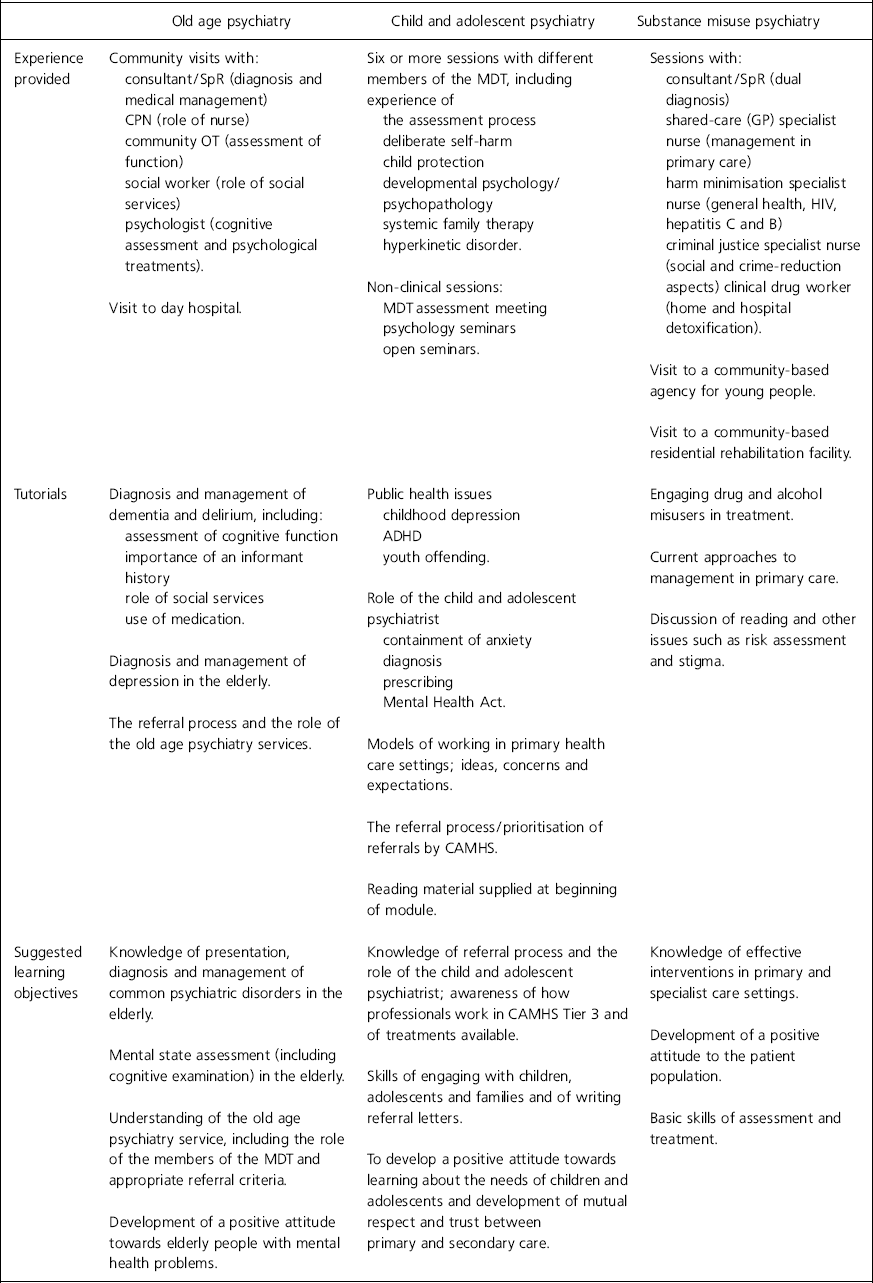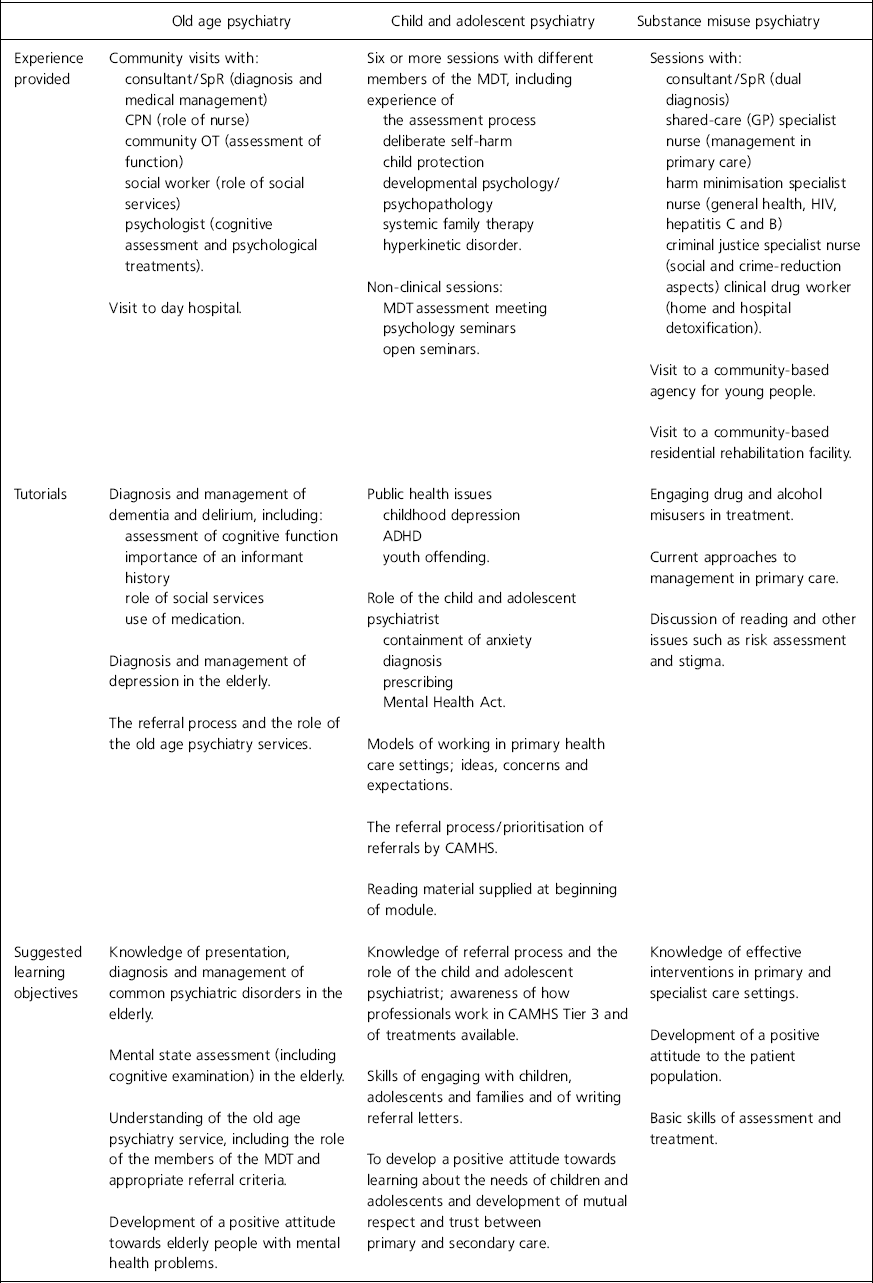As part of training for general practice, approximately 40% of junior doctors will undertake a senior house officer (SHO) post in psychiatry (Reference Ratcliffe, Gask and CreedRatcliffe et al., 1999). The majority of such posts will be within general adult psychiatry. As a result of this general practitioner (GP) trainees often receive little exposure to old age psychiatry or child and adolescent psychiatry. Similarly, although trainees will inevitably gain some experience of substance misuse associated with mental illness, there is little opportunity to develop skills in addressing primary substance misuse disorders and there is a clear need to develop better skills in the recognition and management of psychiatric comorbidity (Reference Commander, Odell and WilliamsCommander et al, 1999).
There is evidence that GPs feel they do not receive adequate teaching in the diagnosis and management of some mental health problems during their training (Reference WilliamsWilliams, 1998). This has been demonstrated most clearly in the area of alcohol (Reference McAvoyMcAvoy, 1997) and drug problems (Reference Abed and Nierra-MunozAbed & Nierra-Munoz, 1990). There are similar findings in the fields of child and adolescent psychiatry (Reference Orr, Weiser and DianOrr et al, 1987) and old age psychiatry (Reference Tinsley, Shadid and LiTinsley et al, 1998).
There is evidence that appropriate educational interventions can have a beneficial effect on GPs' ability to manage psychological problems such as drug misuse (Reference King, Hindler and NazarethKing et al, 1998).
The aim of vocational training for general practice is to provide a broad base of clinical experience in areas relevant to primary care. The Royal College of General Practitioners encourages the development and evaluation of novel teaching programmes, including, for example, short-term supervised out-patient attachments (Royal College of General Practitioners, 1994). However, a balance has to be struck between providing a broad spread of educational opportunities and ensuring that trainees obtain sufficient hands-on clinical experience in order to consolidate their knowledge. The trainee's contribution to service delivery also has to be considered.
Additional clinical experience (ACE) modules have previously been used in paediatrics to enable specialist registrars to gain extra training in particular areas of paediatric medicine and surgery. One of the authors (S.M.J) initially adapted this idea to the training of GP registrars in child and adolescent psychiatry. Subsequently we have developed modules to provide GP registrars with additional educational opportunities in old age psychiatry and substance misuse.
General structure of modules
The content of each ACE module is flexible and can be tailored to the needs of individual GP registrars. Training requirements are discussed at an initial meeting between GP registrar and consultant, and a suitable educational programme is developed. All three modules have the same basic structure. For each module, over a period of up to 12 weeks trainees are offered a minimum of 6 sessions with different members of the multi-disciplinary team. The supervising consultant provides two or three tutorials and suggestions are provided for further reading. Trainees are given the option of preparing a small project, usually a case report including a critical discussion of some aspect of management with reference to the relevant research literature. The specific learning objectives and structure of each module is given in Box 1.
Box 1. Contents of additional clinical experience (ACE) modules for general practitioner trainees in old age psychiatry, child and adolescent psychiatry and substance misuse psychiatry

| Old age psychiatry | Child and adolescent psychiatry | Substance misuse psychiatry | |
|---|---|---|---|
| Experience provided |
|
|
|
| Tutorials |
|
|
|
| Suggested learning objectives |
|
|
|
The aim is to provide basic skills and knowledge relevant to primary care. This includes the presentation and assessment of conditions that are commonly encountered in general practice, knowledge of effective interventions, information regarding referral criteria and the role of the different members within the multi-disciplinary team.
The long-term goal is to improve the knowledge and skills of GPs in the recognition and management of mental health problems occurring across the life span. One of the core aims is to encourage the development of a positive attitude to patient groups that have often been seen as ‘difficult’ or ‘unpopular’. Many GP registrars become principals in the locality in which they have trained and it is hoped that this additional education will have a positive future influence in areas such as referral patterns and commissioning (via primary care trusts).
Findings
The rate of uptake of these placements is high, and trainees have been very positive in their comments. Several trainees have undertaken two, or even all three, of the ACE modules within their 6-month psychiatry placement. The local general practice vocational training scheme organiser has also been very positive about these additional educational opportunities.
The major problem encountered so far is that of time pressures, both on the part of trainee psychiatrists (GP registrars) wishing to undertake these modules, and on the consultants and other multi-disciplinary team members offering such training. Overall, the educational supervisors in general adult psychiatry have been encouraging and have enabled trainees to be released from their normal duties to attend.
Conclusions
As the popularity of this training grows, we hope that other consultants within our departments will become involved, thus further broadening the educational experiences available. We would like to make structured assessments of those GP registrars undertaking these modules in order to formally assess and refine the effectiveness of this method of teaching. The Royal College of General Practitioners has suggested that vocational training could be augmented with a period of higher professional education during the early years as a GP principal. We believe that our model would offer a very suitable means of delivering such additional educational experience.
It is clear that GPs require and want additional training in psychiatric sub-specialities. We would suggest that the modules described above offer an acceptable and cost effective means of providing this, and could be organised relatively easily in most areas.




eLetters
No eLetters have been published for this article.